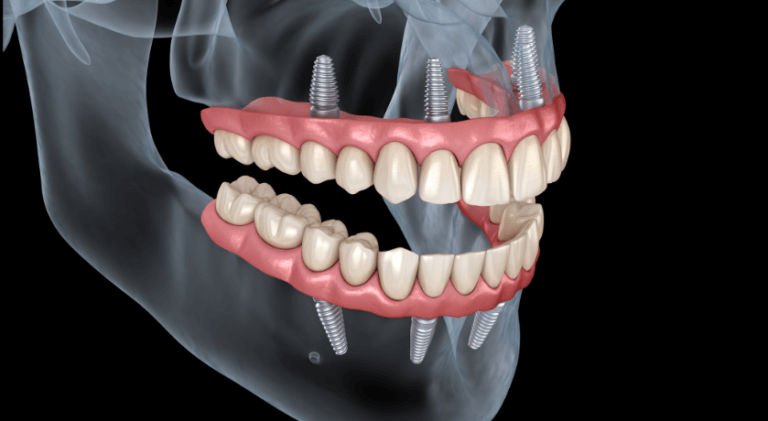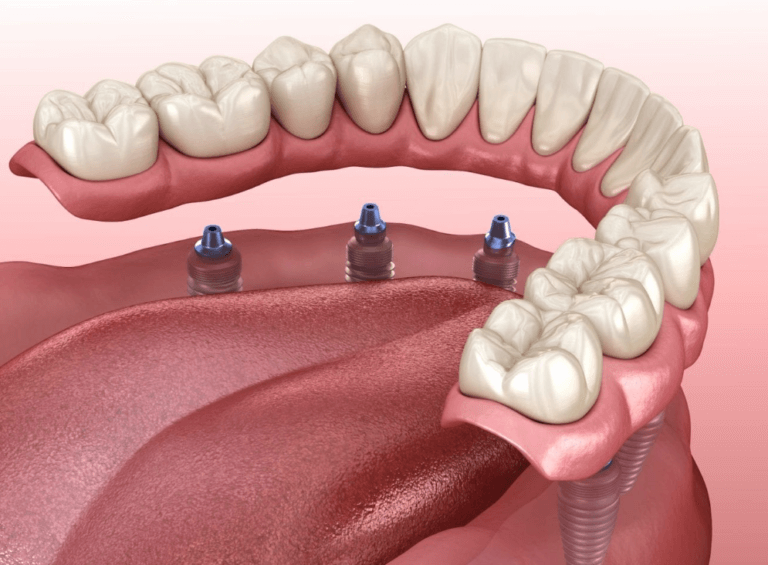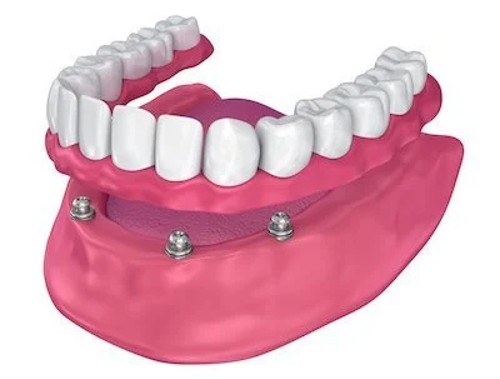Implant Denture

What Is An Implant Denture?
An Implant Denture (or implant-supported overdenture) is a type of dental appliance designed to replace missing teeth by securely attaching prosthetic teeth to dental implants surgically placed in the jawbone. This approach provides a more stable, comfortable, and natural-feeling alternative to removable dentures.
Implant Dentures provide a life-changing solution for people who have lost most or all of their teeth. Before deciding on whether An Implant Denture are right for you, there are some things you should know:
- Who Needs An Implant Denture?
- Benefits of Implant Dentures
- Alternative Treatments To Implant Dentures
- How Much Does An Implant Denture Cost?
- Steps In The Implant Denture Procedure
- Frequently Asked Questions About Implant Dentures
If you have any further questions about An Implant Denture or other dental services offered at Atlas Dental, please contact us.

Free Phone Consultation
Have questions about implant dentures for missing teeth? Book a free phone consult with our Toronto dentist

5 star google reviews
Our patients love their cosmetic looking implant dentures! See for yourself why patients choose Atlas Dental.

Book an implant denture appointment online
We make custom fitted implant dentures to help our patients smile confidently again.
Who Needs An Implant Denture?
Implant dentures are particularly beneficial for:
- Completely Edentulous Patients: Ideal for those who have lost all teeth in the upper or lower jaw and need a secure, full-arch replacement.
- Individuals with Significant Tooth Loss: If you have only a few remaining teeth that are severely damaged, an implant-supported denture can provide a full-arch restoration, improving your oral health and quality of life.
- People Facing Traditional Denture Challenges: If you’re experiencing discomfort, slipping, or difficulty with traditional dentures, implant dentures offer enhanced stability.
- Those Concerned About Jawbone Health: Dental implants help stimulate and preserve the jawbone, reducing bone loss and maintaining facial structure.
- Patients Seeking a Long-Lasting Solution: With proper care, implant dentures can last 10-20 years or more, far outlasting traditional dentures.
To determine if implant dentures are right for you, consult with a qualified dentist or oral surgeon who can assess your jawbone health and overall suitability for the procedure. If you have further questions about Implant Dentures, please contact us.
Benefits of Implant Dentures
Implant-supported dentures offer several key benefits over traditional dentures, making them a highly popular choice for dental restoration:
- Improved Stability & Chewing Function: Implants act as a strong anchor, allowing you to chew a wider variety of foods with ease.
- Enhanced Speech Clarity: With a secure fit, implant dentures reduce the risk of slurred or muffled speech caused by slipping dentures.
- Increased Comfort & Convenience: Without the need for denture adhesives, implant dentures offer a more natural fit, and the appliance can be easily removed for cleaning.
- Jawbone Preservation: By stimulating the jawbone, implants help prevent bone resorption, which maintains facial aesthetics.
- Long-Lasting Durability: Properly maintained, implant dentures can offer a reliable, long-term solution.
- Natural-Looking Aesthetics: Implant dentures restore a natural, confident smile, boosting self-esteem and improving quality of life.
- Preserved Taste & Sensation: Unlike traditional dentures, implant-supported options leave the palate uncovered, preserving taste and sensation.
Before opting for this treatment, it is essential to consult with a qualified dental professional who can assess your specific dental needs and guide you through the process of obtaining a beautiful and functional smile with the help of Implant Dentures. If you have further questions about Implant Dentures, please contact us.

Alternative Treatments To Implant Dentures
If an implant denture isn’t suitable for you, there are other options to consider for replacing missing teeth:
- Complete Dentures: Removable prosthetics that replace all teeth in the upper or lower jaw, secured with suction or adhesives. They’re cost-effective but may lack the stability and comfort of implants.
- Tooth-Supported Overdentures: These removable dentures fit over remaining natural teeth, providing more stability and some jawbone preservation.
- Dental Bridges: Fixed prosthetics that replace one or more teeth, anchored by crowns on adjacent natural teeth. They offer stability but require modifying healthy teeth.
- Removable Partial Dentures: For patients with some natural teeth, these affordable options fit around existing teeth but may not provide the same comfort as implants.
Each option has unique benefits and limitations. Consult with a dentist to choose the best solution for your needs. If you have further questions about Implant Dentures, please contact us.
Cost of Complete Dentures
Dentures can range in cost from $591 to 2053 plus dental lab fee, depending on the type of denture. Example of denture codes found in the Ontario Dental Association’s Suggested Fee Guide appear as follows:
Dentures, Complete, Standard (e.g. Complete Denture)
- 51101 – Maxillary: $1142 + Dental Lab Fee
- 51102 – Mandibular: $1454 + Dental Lab Fee
Dentures, Complete, Provisional (e.g. Immediate Complete Denture)
- 51601 – Maxillary: $591 + Dental Lab Fee
- 51602 – Mandibular: $789 + Dental Lab Fee
Dentures, Complete, Overdentures, Tissue Borne, Supported by Natural Teeth (e.g. Tooth Supported Overdenture)
- 51711 – Maxillary: $1669 + Dental Lab Fee
- 51712 – Mandibular: $2053 + Dental Lab Fee
Dentures, Complete, Overdentures, Tissue Borne, Supported by Implants (e.g. Implant Denture; cost of dental implants not included)
- 51721 – Maxillary: $1669 + Dental Lab Fee
- 51722 – Mandibular: $2053 + Dental Lab Fee
Dentures are sometimes considered a supplementary service by dental insurance plans and may or may not be covered by your dental insurance. Be sure to find out from your dental insurance plan provider how much you are eligible for before going ahead with dental treatment. Your dentist can help you submit an predetermination to your dental insurance. Our fees are consistent with the ODA Fee Guide.
For patients without dental insurance, Atlas Dental is pleased to offer dental financing through iFinance Dentalcard. Affordable payment plans start at 7.95% for terms of 6 months to 6 years. To learn more about Dentalcard dental treatment financing, follow this link.
Steps In The Implant Denture Procedure
The journey to implant-supported dentures involves several carefully planned steps:
- Consultation & Examination: A dental professional evaluates your oral health, takes X-rays, and discusses treatment options.
- Treatment Planning: A customized plan is created, determining the number of implants needed and their optimal placement.
- Implant Placement: Titanium posts are surgically placed in the jawbone. Local anesthesia or sedation may be used.
- Healing & Osseointegration: Over several months, the implants fuse with the jawbone, establishing a stable base for the denture.
- Abutment Placement: Abutments are attached to the implants to serve as connectors for the denture.
- Denture Fabrication & Fitting: A custom overdenture is crafted to ensure a comfortable, secure fit over the abutments.
- Final Adjustments: Once the denture is in place, any necessary adjustments are made to optimize comfort and functionality.
The Implant Denture procedure offers a transformative solution for missing teeth, improving oral function, aesthetics, and confidence. If you have further questions about Implant Dentures, please contact us.

Frequently Asked Questions About Implant Dentures
- How long do implant dentures last?
With proper care, implant dentures can last over a decade, often 10-20 years or longer. Regular dental visits and good oral hygiene practices are essential to prolong their lifespan.
- Can implant dentures improve jawbone health?
Yes, implants stimulate the jawbone, helping to prevent bone loss that often occurs with missing teeth.
- Are implant dentures covered by insurance?
Coverage varies. Check with your provider to determine if implant dentures are included in your plan. Financing options are also available for uninsured patients.
- How do I care for implant dentures?
Clean around the implants as recommended by your dentist, and visit your dentist regularly for checkups to ensure the denture remains well-fitted and functional. Please read our Dental Implant Bridge Home Care Instructions.
Implant dentures provide a stable and comfortable solution for replacing missing teeth, enhancing both function and appearance. If you’re interested in learning more about implant dentures or want to find out if you’re a candidate, please contact us.

